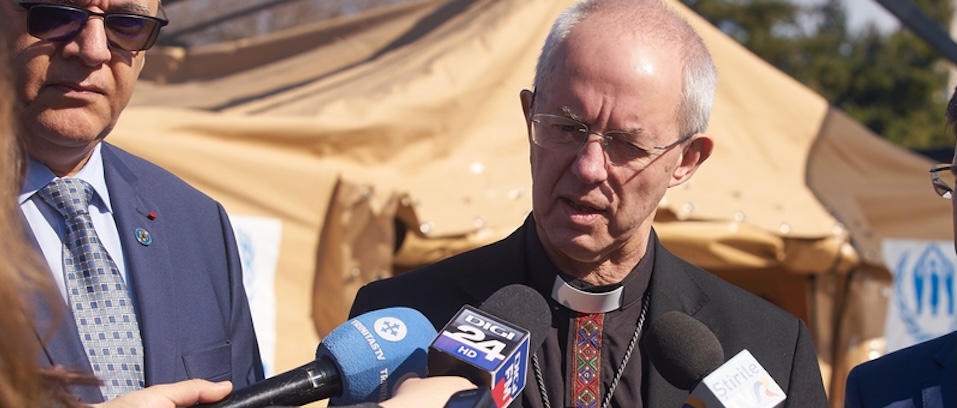The resignation of the Archbishop of Canterbury, Justin Welby, following the damning Makin Report into the heinous crimes of serial abuser John Smyth, whose severe beatings of students from as far back as the 1980s, exposes problems within the Church of England that point to long-standing doctrinal, disciplinary, and cultural issues that will both determine who takes his place and how the church has come to this sorry pass.
John Smyth used both the theology and the structures of Anglican conservative evangelicalism to cover up his crimes. Archbishop Welby was connected to Smyth in several ways but, crucially in the eyes of the report, failed to act appropriately when the seriousness of the abuse was explicitly drawn to his attention, creating further opportunities for Smyth to continue to offend.
How was this allowed to happen? A significant part of English evangelicalism, though by no means the entirety, has been formed and shaped through specific aspects of the English class and education system. Christian summer camps, aimed at students from certain English residential schools, were built upon principles of deference and discipline infused with theological purpose. The perpetrators invested physical punishment with divine authority. Suffering was seen as sacred, quite different to the biblical position that Christians will inevitably face and must endure suffering in a fallen world.
From this, a theological problem emerged. As the allegations against John Smyth gradually emerged from within the camp system (the camps were run by a not-for-profit organization but staffed and overseen by Church of England members and clergy), the instinct was to cover over potential crimes and seek other ways of diverting attention from the problem. One leader even commented that to make the abuse known would damage God’s work, as if it were not the committing of the terrible abuses that damaged gospel work, not to mention their cover-up.
What was the specific theology that led to this position? First, an overemphasis on personal piety at the expense of any recognition that God also works in his created world. This leads to a denigration of the body and the material in favor of the spiritual and heavenly. Consequently, what really matters is not that some abuse has been committed or status quo procedure followed, but whether the victims had their ticket to heaven. In addition is the question of whether God can work through secular, non-Christian agencies to address such issues. The Old Testament certainly suggests this is so, using both the Assyrians and the Babylonians to achieve his purposes. One aspect of the Reformed Protestant principle of “common grace” is that the actions of even the unregenerate may mirror divine purpose or character. The implementation of secular protections, policies, and legal jurisdiction over abuse with the church may in fact reflect God’s divine will for the well-being of all people. Yet the idea of involving the police or other external agencies was rejected by the camp authorities as potentially damaging to the gospel, when the converse was true.
Archbishop Welby was right to resign for reasons of personal and institutional failure. His replacement, unfortunately will not be determined by personal views or preferred policies on safeguarding children but on the much more fundamental divisions within Anglicanism, exemplified by, but not restricted to, the debates over the nature of marriage, and especially same-sex marriage.
The process of appointment of the next archbishop is archaic, if not bizarre. A committee of 19 people (the Crown Nominations Commission) will make the choice. This commission, used in the appointment of all bishops, is constituted in a special way for Canterbury. How will this play out?
The chairman of the commission is appointed by the prime minister. This will be a member of the “great and good,” someone with a commitment to both Anglicanism and the English establishment and, almost certainly, of vague theological convictions (if any at all). The commission itself will consist of two bishops: one is usually the Archbishop of York (unless he is a candidate) and one elected by the House of Bishops. Here are two more votes in the liberal direction. Then things look up a bit.
There are six members appointed by the General Synod of the Church of England, three clergy and three laity. These members are elected to the commission for a five-year term, so we know who they are—four conservative and two liberal votes. The Archbishop of Canterbury is also, somewhat oddly, the run-of-the-mill diocesan bishop for the Diocese of Canterbury, so he gets to elect three people to the commission. At best this would split two liberal votes and one conservative. Then, for the first time, given the international role of the archbishop, the wider Anglican Communion will elect five members, one from each of the continents or major geographical areas. This group is most likely to split three conservative to two liberal.
Now add up the numbers. The commission of 19 looks most likely to divide 9–8 in favor of the more liberal theological position. The number of votes needed on the commission to elect is 13; so we might be heading for a deadlock. Additionally, there are two nonvoting but highly influential secretaries, one of whom is in a same-sex marriage.
We might further divide the contenders into several groups. I will resist the temptation to characterize them as either simply “liberal” or “conservative”; there are several alternative groupings, almost all of which are utterly depressing.
The young turks are younger, generally progressive, inclusive and moderate in their churchmanship and theological disposition—and no one has ever heard of them! The leading contenders here are the Rt. Rev. Graham Usher, Bishop of Norwich, and the Rt. Rev. Martyn Snow, Bishop of Leicester. Outcome? More of what we’ve been seeing in the CofE of late.
The old lags, the bishops who’ve been around a long time, are the same old-fashioned liberal- lefties, in both theology and politics. The Archbishop of York is in this group, although, in reality, he’s too old to succeed to Canterbury. Other contenders here include the Rt. Rev. David Walker of Manchester and the Rt. Rev. Nick Baines of Leeds. Outcome, again, more of the same, and even more of the left-wing politics.
Then we have the women. The main criterion for the appointment of the first round of women bishops was, well, that they were female. I struggle to find any other distinctive criteria among most of them. Nearly all women bishops are sadly progressive and liberal. The Rt. Rev. Rachel Treweek, Bishop of Gloucester, thinks male and female pronouns for God are interchangeable. Another, more intellectually dangerous candidate is the Rt. Rev. Helen-Ann Hartley, Bishop of Newcastle, but she played her hand openly in the downfall of the archbishop, which may count against her. There is also the Rt. Rev. Sarah Mulally, Bishop of London, an establishment figure but theologically very weak, and age may count against her. Something of a campaign is building around the Rt. Rev. Guli Francis-Dehqani, Bishop of Chelmsford, because she comes across slightly less managerial and certainly has something of a strong Christian backstory with an escape from persecution in Iran. She is, however, in favor of the removal of all restrictions on clergy entering same-sex partnerships and of the development of prayers of blessing for same-sex partners. If Bishop Guli emerges, watch how her personal history is played up and the liberal theology played down.
Finally, the abstainers: those bishops who can’t make their mind up on the church’s teaching on marriage, and perhaps other issues. Anyone might think that this group’s real interest was to not rock the boat, so the commission might turn to one of them for Canterbury as a safe pair of hands (or vacillators who will make a stance for nothing). We see here such names as the Rt. Rev. Mark Tanner, Bishop of Chester, and Rt. Rev. Martyn Snow, Bishop of Leicester, pop up again.
So beware the trojan horse—the candidate who has an interesting story, or who has sought to hold the church together in difficult times, or is our first female archbishop, any narrative that is designed to cover up a depressingly progressive liberal theology that stands for nothing and will simply lead the Church of England deeper into the abyss of theological chaos.
What awaits the successful candidate, whoever he or she may be? A church that still has not recovered from COVID and the disastrous and reprehensible decisions of Archbishop Welby and others to close the churches and to ban clergy even from praying in their churches or visiting the sick and dying. Then there are the multiple abuse scandals, including but not restricted to the very one that brought Welby down. The new archbishop will also inherit a church that, thanks to the inept leadership of the bishops, has lost confidence in the power of the preached gospel—or rather has been taught a theology by its leadership that is explicitly contrary to that gospel. Such a church cannot stand.
Is there hope? In God there is always hope, and we pray for a surprise, a candidate who believes in the authority of the Scriptures, in the atoning sacrifice of Jesus, in the actual moral and ethical teaching of the historic faith. The new archbishop does not have to come from the Church of England; many of the African bishops, members of the wider Anglican Communion, believe the gospel and would make fine archbishops (however unlikely). I am also pretty sure that the Rt. Rev. Paul Williams, Bishop of Southwell and Nottingham, one of only a handful of diocesan bishops to have consistently opposed the liberalization of marriage, won’t get through the hoops. Nevertheless, these last two options are worth a prayer or two.

